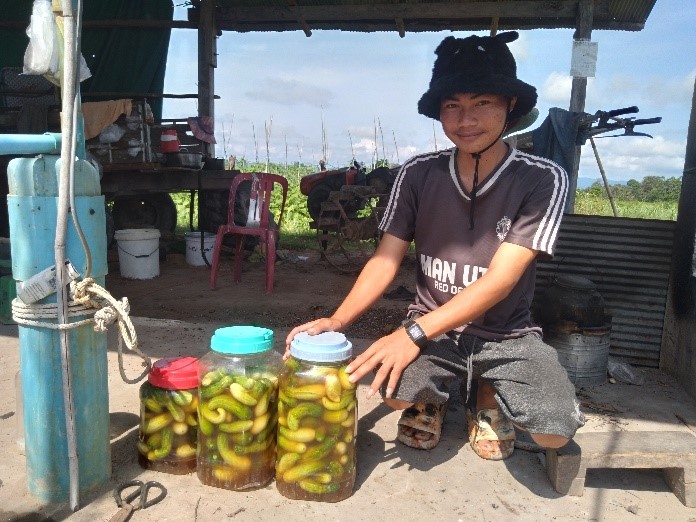
Paying it Forward by Mentoring
Witnessing the important interaction between experienced farmer and leader Rath and inexperienced but enthusiastic young Ratanak, and helps us to see why farmers teaching farmers is such a winning strategy.
At 21, Ratanak is one of the youngest farmers in his area. He’s been passionate about agriculture since the fifth grade when he began raising chickens. He liked growing vegetables and was glad to find out there’s a high market demand for them. But his lack of knowledge prevented him from being successful and threatened to discourage him. Especially during the pandemic when farm work was critical to his family’s very survival.
But he didn’t give up. Instead, he began to ask around for support from farmers who might share their knowledge with him. What he found was even better: a training program and a farmer who was willing to be his champion. Rath, who is a successful local farmer and the leader of a farmer group, had previously received training from other farmers in the program. She could clearly see Ratanak’s promise and was willing to mentor him during his farming journey. Because of his demonstrated commitment to agriculture, she easily convinced other farmers in her agriculture producer group to allow him to join.
As a group member, he has gained more expertise in making compost and liquid fertilizer, gotten better overall results, and improved his production skills. He is also learning more about adding value through processing and packaging his excess vegetables. He was recently invited along on an eye-opening visit to a successful farm operation in another province.
Ratanak has taken advantage of all learning opportunities offered by the local partners. “I hope to learn more about how to make different types of fertilizers and botanical pesticides for different crops,” he says.
He identifies four challenges to farming in the vicinity: a lack of youth engagement, farmers’ limited investments in agriculture, overuse of chemical fertilizers, and high market pressure for low prices.
Ratanak says, “I still need to learn more about how to deal with those key issues in order to increase my income from agriculture. And even though my results are still not as good as I’d expected, I hope they will be soon. I know it always takes time for anyone, including me, to apply technical skills and improve production.”
Cambodia South Program
Led by World Renew and Local Partners Khmer Angka for Development of Rural Areas (KADRA) and Occupation of Rural Economic Development and Agriculture (OREDA)
